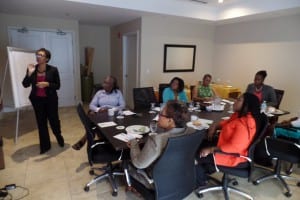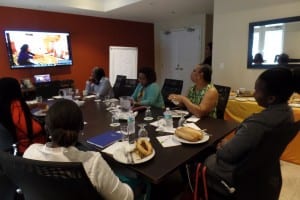 Entrepreneurship in Barbados is in good hands and those are the hands of the women at the top, or in key positions, of some of the organizations in the island whose mandate is to help develop entrepreneurs and entrepreneurship in Barbados.
Entrepreneurship in Barbados is in good hands and those are the hands of the women at the top, or in key positions, of some of the organizations in the island whose mandate is to help develop entrepreneurs and entrepreneurship in Barbados.
I was privileged to have several of them together this week for the presentation of the pilot video of my series The ABCs of Entrepreneurship: Tessa Takes the Challenge and the learning platform which were the work of Cross Media Designs, represented by Barton King and Sophia Prince.Present were Undene Whittaker, head of Women Entrepreneurs of Barbados, Marcia Brandon, Managing Director of the Caribbean Centre of Excellence for Sustainable Livelihoods, Celeste Foster, CEO of the Barbados Entrepreneurship Foundation, Cardelle Fergusson, General Manager of the Barbados Youth Business Trust with Lisa Fenty, Marina Taitt, Director of Export and Business Development at Barbados Investment & Development Corporation and Lynette Holder CEO of the Small Business Association. A serious group of women.

Before introducing the series, I was keen to hear some of the challenges that they are facing as they try to fulfill the goals and visions of their organizations. There were a wide range of issues, money being one of course, but the ones that caught my attention the most were these:
- The need to generate passion in entrepreneurs which would give them staying power when things got tough;
- The need to change the culture of the island so that an entrepreneurial mindset becomes more prevalent
- The need for entrepreneurs to have the mindset and determination to create sustainable enterprises.
It was also felt that there needs to be an overarching united vision for Barbados to create an environment where true entrepreneurs are created, who not only start businesses (usually one-man shows) but can transition those businesses into sustainable ones that will grow and provide employment for others.
In my discussions afterwards, it also became clear that there is a need for a clear definition of entrepreneurship to be made known so that everyone is not calling themselves an entrepreneur and not because entrepreneurs are an elitist group, but so that there is clarity about who or what an entrepreneur really is.
In one of the definitions that I share in my book The ABCs of Entrepreneurship, an entrepreneur can be described as “a person who identifies and starts a business venture, sourcing and organizing the required resources and taking both the risks and rewards associated with the venture”. But how does that differ from a business owner? Some definitions make no distinction, but I see an entrepreneur as someone who goes the extra step by brining creativity or innovation to their business.
For example, I remember being at The Crane last year or the year before and there was an entrepreneurial coconut vendor on the beach selling coconuts. Many guys sell coconuts along the road, but what made him an entrepreneur in my opinion was the fact that he not only sold plain coconut water in the shell (at an exorbitant price I might add), but he also offered cocktails made from coconut water, served from the shell with a straw and decorated with flowers.
Now the next stage of entrepreneurship for him, which is a concern for many of the leaders of the organisations I mentioned, is how to take that business from a one-man show into one that can grow, expand and employ people. And how do we instill that mindset in people like him? The challenge is to get that vendor to register or incorporate his business, standardise and document his cocktail recipes, create a system to deliver the product consistently and then hire people to be on every major beach in Barbados selling his products. Then franchise the idea into the other islands. That is entrepreneurship.
So the bottom line is that not everyone who starts a business is an entrepreneur, but the entrepreneurs are the ones who differentiate their business through some level of innovation or creativity. Granted, not everyone will want to take their business to the level that I described and I don’t think that makes them less of an entrepreneur. For example, they are lifestyle entrepreneurs who are creative and innovative, but want a quality of life that may not be possible by running a large enterprise. Does that make them less of an entrepreneur? So the discussion about who is an entrepreneur continues.
In spite of the challenges that the organizations that were represented face including the frustration of trying to change the culture of Barbados, all of the women are very passionate about what they do and are determined to do whatever is necessary to bring change to the entrepreneurial ecosystem. We have already seen progress through the BEF’s $20 Challenge and other programs. Every year $20 Challenge students, once they have had the opportunity to run a business, realise that they can make entrepreneurship a career choice. It was especially heartening last year, when I was as a judge for the competition, to see that some of the participants had registered their businesses and a number of others planned to continue their business even after the competition finished.
So we still have a way to go, but I am confident that with the passionate and committed women we have at the helm and the fact that many of the organisations are beginning to use technology (including videos) to educate their members, entrepreneurship in Barbados is in good hands.

